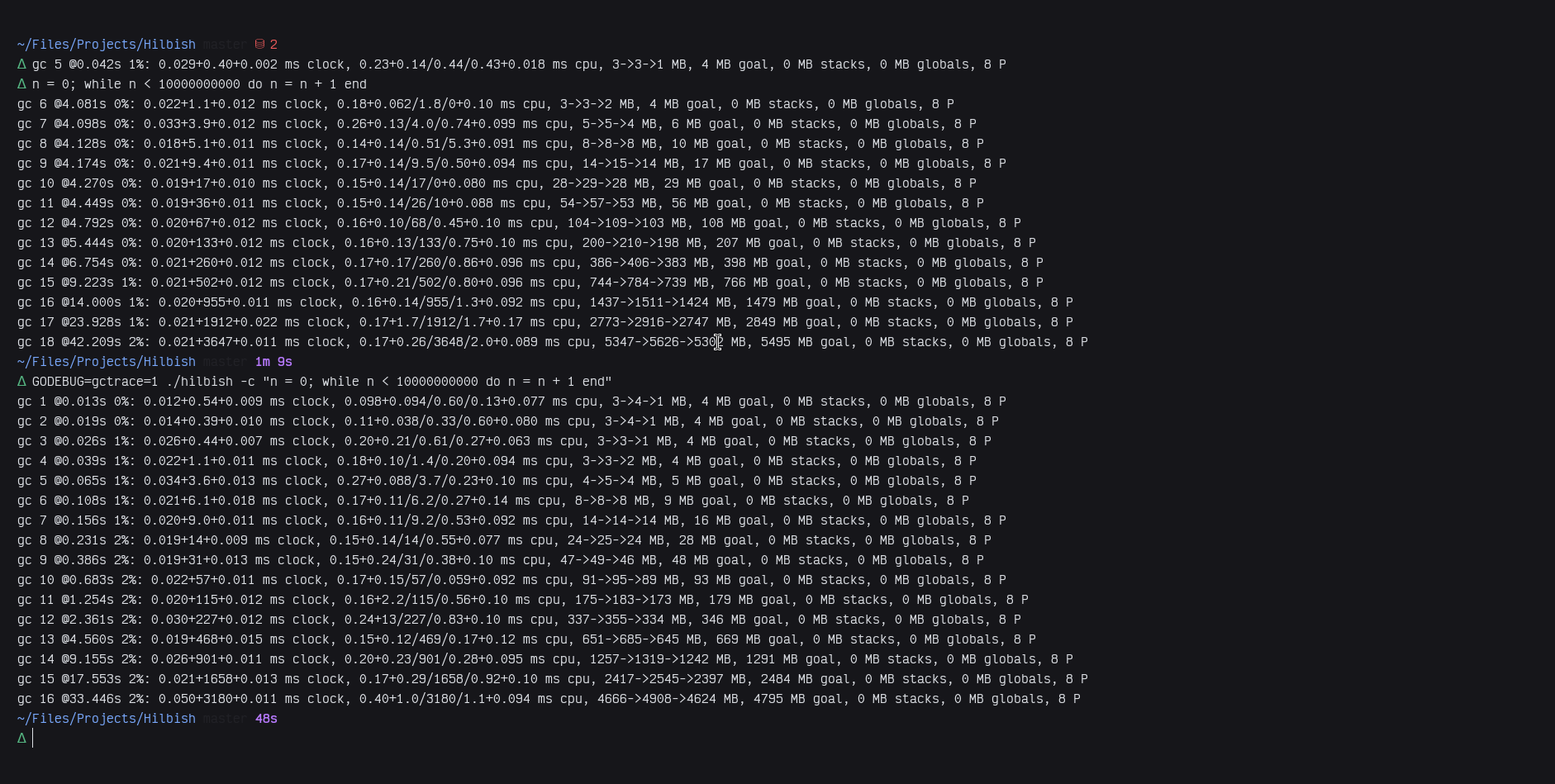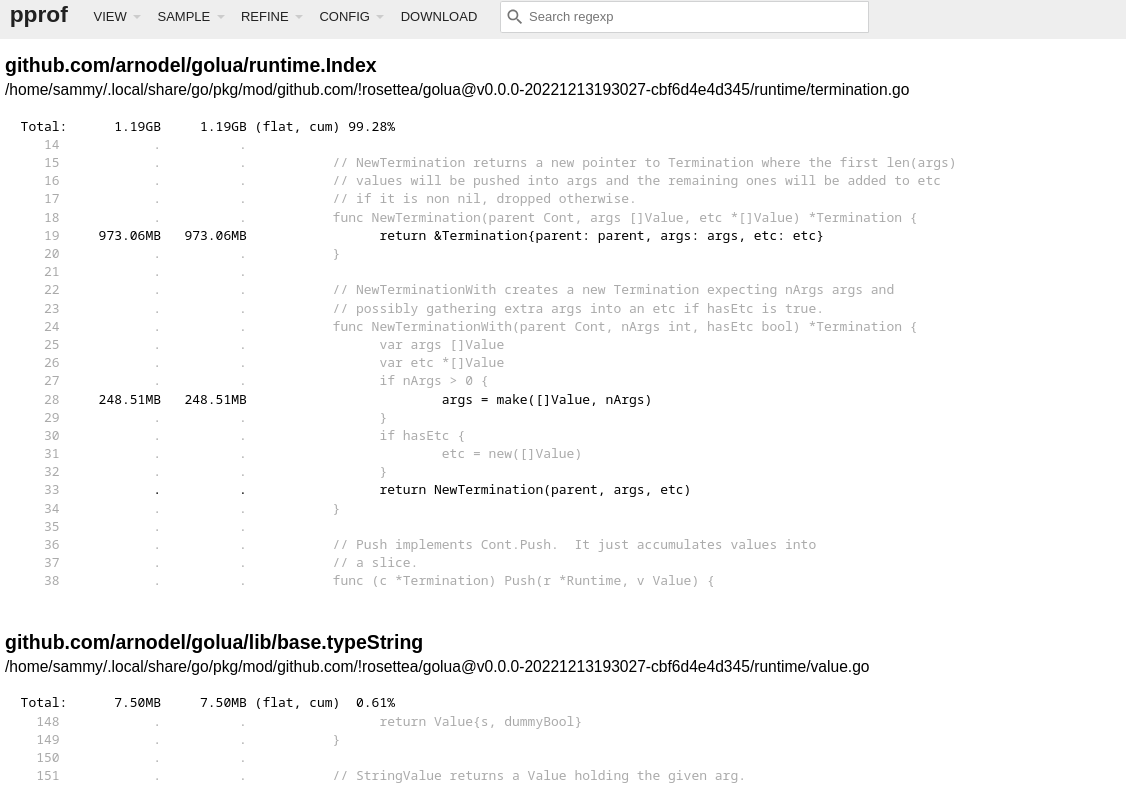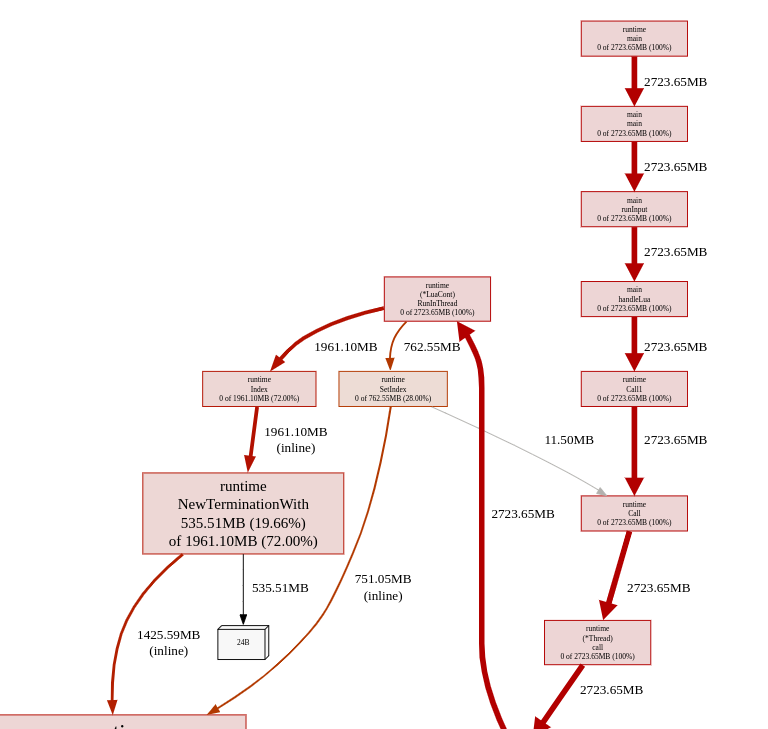Implementation of Lua 5.4 in Go with no third party dependencies. The compiler and runtime are complete (including coroutines), the standard Lua library is mostly implemented.
- GoLua
To install, run:
$ go get github.com/arnodel/goluaTo run interactively (in a repl):
$ golua
> function fac(n)
| if n == 0 then
| return 1
| else
| return n * fac(n - 1)
| end
| end
> -- For convenience the repl also evaluates expressions
> -- and prints their value
> fac(10)
3628800
> for i = 0, 5 do
| print(i, fac(i))
| end
0 1
1 1
2 2
3 6
4 24
5 120
>A unique feature of Golua is that you can run code in a safe execution environment where cpu and memory are restricted. E.g.
$ golua -cpulimit=10000000
> while true do end
!!! CPU limit of 10000000 exceeded
Reset limits and continue? [yN] You can even do this within Lua itself:
$ golua
> a = "a"
> runtime.callcontext({kill={memory=1000000}}, function() while true do a = a..a end end)
killed
> #a
262144For more details read more here.
You can dynamically import Go packages very easily as long as they are already downloaded - this include the standard library. Here is an example of running an http server in the repl:
$ golua
> go = require('golib')
> http = go.import('net/http')
> http.HandleFunc('/hello/', function(w, r)
| w.Write('hi there from Lua! You requested ' .. r.URL.Path)
| end)
> http.ListenAndServe(':7777')In another terminal you can do:
$ curl http://localhost:7777/hello/golua
hi there from Lua! You requested /hello/goluaTo run a lua file:
$ golua myfile.luaOr
cat myfile.lua | goluaE.g. if the file myfile.lua contains:
local function counter(start, step)
return function()
local val = start
start = start + step
return val
end
end
local nxt = counter(5, 3)
print(nxt(), nxt(), nxt(), nxt())Then:
$ golua myfile.lua
5 8 11 14Errors produce useful tracebacks, e.g. if the file err.lua contains:
function foo(x)
print(x)
error("do not do this")
end
function bar(x)
print(x)
foo(x*x)
end
bar(2)Then:
$ golua err.lua
2
4
!!! error: do not do this
in function foo (file err.lua:3)
in function bar (file err.lua:8)
in function <main chunk> (file err.lua:11)
It's very easy to embed the golua compiler / runtime in a Go program. The example below compiles a lua function, runs it and displays the result.
// First we obtain a new Lua runtime which outputs to stdout
r := rt.New(os.Stdout)
// This is the chunk we want to run. It returns an adding function.
source := []byte(`return function(x, y) return x + y end`)
// Compile the chunk. Note that compiling doesn't require a runtime.
chunk, _ := r.CompileAndLoadLuaChunk("test", source, rt.TableValue(r.GlobalEnv()))
// Run the chunk in the runtime's main thread. Its output is the Lua adding
// function.
add, _ := rt.Call1(r.MainThread(), rt.FunctionValue(chunk))
// Now, run the Lua function in the main thread.
sum, _ := rt.Call1(r.MainThread(), add, rt.IntValue(40), rt.IntValue(2))
// --> 42
fmt.Println(sum.AsInt())It's also very easy to add write Go functions that can be called from Lua code. The example below shows how to.
This is the Go function that we are going to call from Lua. Its inputs are:
t: the thread the function is running in.c: the go continuation that represents the context the function is called in. It contains the arguments to the function and the next continuation (the one which receives the values computed by this function).
It returns the next continuation on success, else an error.
func addints(t *rt.Thread, c *rt.GoCont) (rt.Cont, error) {
var x, y rt.Int
// First check there are two arguments
err := c.CheckNArgs(2)
if err == nil {
// Ok then try to convert the first argument to a lua integer (rt.Int).
x, err = c.IntArg(0)
}
if err == nil {
// Ok then try to convert the first argument to a lua integer (rt.Int).
y, err = c.IntArg(1)
}
if err != nil {
// Some error occured, we return it in our context
return nil, err
}
// Arguments parsed! First get the next continuation.
next := c.Next()
// Then compute the result and push it to the continuation.
t.Push1(next, x + y)
// Finally return the next continuation.
return next, nil
// Note: the last 3 steps could have been written as:
// return c.PushingNext(x + y), nil
}The code sample below shows how this function can be added to the Lua runtime environment and demonstrates calling it from Lua.
// First we obtain a new Lua runtime which outputs to stdout
r := rt.New(os.Stdout)
// Load the basic library into the runtime (we need print)
base.Load(r)
// Then we add our addints function to the global environment of the
// runtime.
r.SetEnvGoFunc(r.GlobalEnv(), "addints", addints, 2, false)
// This is the chunk we want to run. It calls the addints function.
source := []byte(`print("hello", addints(40, 2))`)
// Compile the chunk.
chunk, _ := rt.CompileAndLoadLuaChunk("test", source, r.GlobalEnv())
// Run the chunk in the runtime's main thread. It should output 42!
_, _ = rt.Call1(r.MainThread(), chunk)You can also make custom libraries and use Go values in Lua (using e.g. the
runtime.UserData type). There is an example implementing a regex Lua
package that uses Go regexp.Regexp in examples/userdata
To implememt the Lua programming language in Go, easily embeddable in Go applications. It should be able to run any pure Lua code
- clean room implementation: do not look at existing implementations
- self contained: no dependencies
- small: avoid re-implementing features which are already present in the Go language or in the standard library (e.g. garbage collection)
- register based VM
- no call stack (continuation passing), tail call optimisation.
- The lexer is implemented in the package
scanner. - The parser is hand-written and implemented in the
parsingpackage.
The ast package defines all the AST nodes. The astcomp package defines a
Compiler type that is able to compile an AST to IR, using an instance of
ir.CodeBuilder.
The ir package defines all the IR instructions and the IR compiler.
The runtime bytecode is defined in the code package. The ircomp package
defines a ConstantCompiler type that is able to compile IR code to runtime
bytecode, using an instance of code.Builder.
The runtime is implemented in the runtime package. This defines a
Runtime type which contains the global state of a runtime, a
Thread type which can run a continuation, can yield and can be
resumed, the various runtime data types (e.g. String, Int...). The
bytecode interpreter is implemented in the RunInThread method of the
LuaCont data type.
There is a framework for running lua tests in the package luatesting. In the
various Go packages, if there is a lua directory, each .lua file is a test.
Expected output is specified in the file as comments of a special form, starting
with -->:
print(1 + 2)
--> =3
-- "=" means match literally the output line
print("ababab")
--> ~^(ab)*$
-- "~" means match with a regexp (syntax is go regexp)Most of the code is covered with such Lua tests. Specific packages or functions are covered with Go tests.
Lua provides a test suites for each version (https://www.lua.org/tests/). There is an adapted version of the 5.4.3 tests here which is supposed to be passed by the latest version of Golua. It is the form of a PR so that the difference with the original test suite can be seen easily.
Assuming golua is installed on your system, those tests can be run from the
root of the repository above as follows.
golua -u -e "_U=true" all.luaFor the moment db.lua is disabled (the file testing the debug module). All
other "soft" tests are run, some with adaptations. The most significant
differences are in error messages.
The lib directory contains a number of package, each implementing a
lua library.
base: basic library. It is complete.coroutine: the coroutine library, which is done.packagelib: the package library. It is able to load lua modules but not "native" modules, which would be written in Go. Obviously this is not part of the official Lua specification. Perhaps using the plugin mechanism (https://golang.org/pkg/plugin/) would be a way of doing it. I have no plan to support Lua C modules!stringlib: the string library. It is complete.mathlib: the math library, It is complete.tablelib: the table library. It is complete.iolib: the io library. It is complete.utf8lib: the utf8 library. It is complete.debug: partially implemented (mainly to pass the lua test suite). Thegetupvalue,setupvalue,upvalueid,upvaluejoin,setmetatable, functions are implemented fully. Thegetinfofunction is partially implemented. Thetracebackfunction is implemented but its output is different from the C Lua implementation. Thesethookandgethookvalues are implemented - line hooks may not be as accurate as for C Lua.ospackage is almost complete -exitdoesn't support "closing" the Lua state (need to figure out what it means.)




